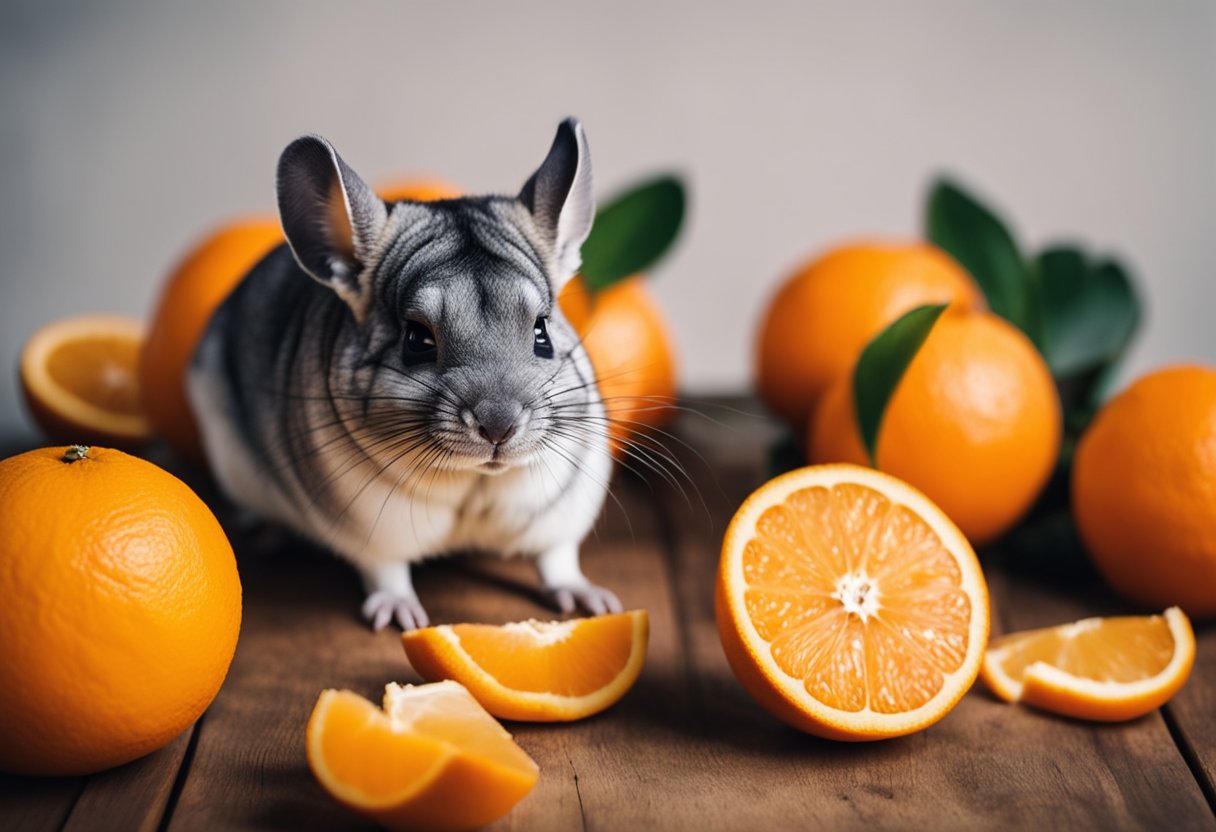Can Chinchillas Eat Oranges? Understanding Their Dietary Needs
Chinchillas are adorable pets that require a specific diet for their health. Many owners wonder about the safety of feeding them fruits, especially oranges. Chinchillas should not eat oranges regularly due to their high sugar and acidic content, which can cause digestive issues. While the occasional tiny piece might be safe, it’s essential to know the right approach to their diet.

Understanding chinchilla dietary needs is vital for keeping them healthy and happy. Their natural diet does not include fruits, and overindulgence in sugary treats like oranges can lead to serious health problems. This article will guide you through what you need to know about feeding oranges and the best practices for a chinchilla’s diet.
Key Takeaways
- Chinchillas may eat small amounts of fruit but should avoid sugary foods like oranges.
- A proper chinchilla diet is mostly hay and pellets for their health.
- Understanding what to feed your chinchilla is crucial for their well-being.
Chinchilla Dietary Basics

Understanding what chinchillas eat is essential for their health. Your chinchilla’s diet should reflect its natural eating habits, focusing on high-fiber foods and minimal sugars.
Natural Habitat Diet
In the wild, chinchillas primarily consume grasses, leaves, and some seeds. This natural diet is high in fiber, which is crucial for their digestive health.
Key Components:
- Grasses: Main food source, providing necessary fiber.
- Hay: Essential for domesticated chinchillas, mimicking their natural forage.
- Vegetation: Occasional leaves and shoots contribute to their nutrient intake.
Chinchillas tend to avoid sugary foods and fruits in their natural habitat. Their bodies are designed to handle high-fiber, low-sugar foods. This diet ensures that they maintain healthy teeth and a well-functioning digestive system.
Domestic Chinchilla Nutrition Requirements
For your chinchilla at home, the diet should include a variety of components. The basis should consist of high-quality hay and specially formulated pellets.
Daily Nutrition Guidelines:
- Hay: Unlimited access to timothy or orchard grass hay.
- Pellets: 30 to 80 grams of chinchilla-specific pellets each day.
- Treats: Small portions of safe fruits or veggies, provided sparingly.
Avoid giving your chinchilla foods high in fat, sugar, or starch, as these can lead to health issues. Regularly monitoring their intake of fresh foods helps maintain a balanced diet and prevents digestive problems.
Oranges and Chinchillas

Chinchillas have specific dietary needs that do not align well with citrus fruits like oranges. You should understand the health risks associated with feeding oranges to your chinchilla and explore safer fruit options that can be offered as occasional treats.
Health Risks of Citrus Fruits
Feeding your chinchilla oranges can pose several health risks. Oranges have high levels of acidity and sugar, which can lead to digestive problems. Common issues include stomach pain and diarrhea. Chinchillas have sensitive digestive systems, so introducing acidic foods can upset their balance.
Additionally, oranges contain phosphorus, which can interfere with calcium absorption. This is important since chinchillas need proper calcium levels for strong bones. If consumed regularly, oranges can result in long-term health issues, making it essential to avoid them altogether.
Safer Fruit Alternatives
Instead of oranges, consider these safer fruit alternatives for your chinchilla:
- Apples: Remove seeds, and offer in small pieces.
- Bananas: Give in moderation due to sugar content.
- Blueberries: A tasty treat packed with antioxidants.
- Strawberries: Can be a hydrating and sweet option.
- Grapes: Offer a small amount to avoid excessive sugar intake.
When introducing any new fruit, do so gradually. Monitor your chinchilla for any digestive issues. Remember that fruits should only make up a small portion of their diet, no more than 10%. Always prioritize their primary diet of hay and pellets for optimal health.
Resources

When considering what fruits are suitable for your chinchilla, you’ll want to gather reliable information. Here are some valuable resources:
- Dietary Guidelines: You can learn more about chinchilla nutrition, including safe fruits, by visiting this helpful guide on feeding chinchillas.
- Fruits to Avoid: Understanding which fruits are harmful is important. For specific details on the risks of feeding oranges to chinchillas, refer to this article about the effects of oranges on chinchillas.
- Fruit Recommendations: If you’re curious about various fruits, check out this list of fruits chinchillas can eat. It offers extensive information on what’s safe and what’s not.
- Healthy Treats: For tips on treating your chinchilla to occasional snacks, read this resource on appropriate treats for chinchillas. It provides insight into suitable options.
Keeping your chinchilla healthy requires knowledge of their dietary needs. Explore these resources for accurate and helpful information.
Frequently Asked Questions

You might have questions about what fruits are safe for your chinchilla and what dietary restrictions are important. Understanding these points can help you keep your pet healthy and happy.
What fruits are safe for chinchillas to eat?
Some fruits can be given to chinchillas in moderation. Safe options include small amounts of dried fruits like apples and pears. Fresh fruits like strawberries can be offered, but only sparingly due to their sugar content.
What are the dietary restrictions for chinchillas?
Chinchillas have specific dietary needs. Their main diet should consist of hay, pellets, and water. Fruits and treats should be limited and used occasionally to prevent health issues like obesity and digestive problems.
Can chinchillas consume apples without harm?
Yes, chinchillas can eat apples, but only in small amounts. Apples should be given as a treat and not a regular part of their diet due to high sugar levels. Remove seeds and skin before feeding them the fruit.
Should chinchillas be given bananas as part of their diet?
No, chinchillas should not eat bananas. Bananas are high in sugar and can cause stomach pain or constipation. If offered, they should be given in very small quantities.
Are there any fruits that are toxic to chinchillas?
Certain fruits should be avoided entirely. Fruits like grapes and citrus can be too acidic and may upset your chinchilla’s stomach. Stick to safer options for treats.
Is it safe for chinchillas to eat vegetables like cucumbers and carrots?
Yes, chinchillas can eat some vegetables, but they should be given in small amounts. Vegetables like cucumbers are safe, while carrots should be limited because of their sugar content. Always introduce new foods gradually to monitor for any digestive issues.

